I have recently been involved in reviewing the applications for the British Safety Council’s International Safety Awards for 2019, which have attracted in excess of 550 submissions across all sectors and from the UK and other countries.
Opinion
Accentuating the positive!
While the scope and subject matter of the applications was very varied, it was both heartening and inspiring to learn of the ways in which health, safety and wellbeing have been embraced across so many different cultures and workplaces. Some of the most impressive examples were those of a fairly simplistic nature but which had improved the working lives of many stakeholders within the applicant organisation.
What struck me most significantly in all of the examples provided was the absolutely genuine commitment from those in senior management positions to improve the workplace for their employees. In my experience, it is all too easy for those in top management positions to say the right things in relation to health, safety and wellbeing but far less easy to demonstrably follow up those words with credible commitment that brings about real change. All too often well-meaning words are not followed up by commitment and operational and commercial demands still take priority.
The current focus on mental health within the workplace is perhaps a case in point. While the emphasis on the psychological wellbeing of employees – and others – is a laudable and welcomed shift in health and safety management trends, I must confess to being somewhat cynical – rightly or wrongly – at people in senior management positions who have suddenly acquired ‘in-depth’ knowledge in this subject area, however well-meaning the motivation may be.
Any organisation with a progressive and mature culture will be far more likely to have open dialogue with employees who are experiencing mental health issues. This may not always involve senior management in those discussions, but rather with people who have an empathetic perspective, possibly from having gone through similar experiences themselves.
A progressive organisation will recognise the value of a suitable support network, which may well be as straightforward as a peer group forum or individual mentor. This may not need the involvement of senior management other than for ensuring necessary resources and commitment are established.
Having been subject to such a psychological issue over the years, I can personally testify the untold damage caused by unsympathetic management and poor support mechanisms.
The International Safety Awards this year included a question focused upon wellbeing initiatives and it was quite humbling in some instances to learn of the genuine commitment to improving personal wellbeing of employees shown by many organisations. This was often illustrated by awareness campaigns related to such issues as stress, anxiety and depression.
The British Safety Council’s programme Mates in Mind is totally dedicated to enhancing workplace mental health provision through education, information and support. The initial focus has been within the construction sector in particular, but is now inclusive of many other sectors. The sensitive and genuinely committed approach from the personnel involved is a model example of how people can be supported and assisted in an empathetic manner when they are struggling with mental health related problems.
The International Safety Awards process has certainly made me take stock of the sole reason I became involved in health and safety management some 25-plus years ago, namely to make a difference to workplace health and safety in some way, however small that may be.
Perhaps it is something we all should reflect upon from time to time and focus on what is really important in life.
—
David Parr
Director of policy and technical services
British Safety Council
OPINION

ISO mental health standard needs a multi-disciplinary approach
By Phil Newton, Pinsent Masons LLP on 01 April 2022

Why your business should act on engine idling
By Jack Alexander, project officer, Idling Action London on 01 October 2021

The air we breathe is all our business
By Nicky O’Malley, director of corporate partnerships, Global Action Plan on 01 June 2023
Businesses have a vital role to play in improving air quality – and the UK’s Clean Air Day on 15 June is a great opportunity for companies to begin or renew their efforts in this area.



